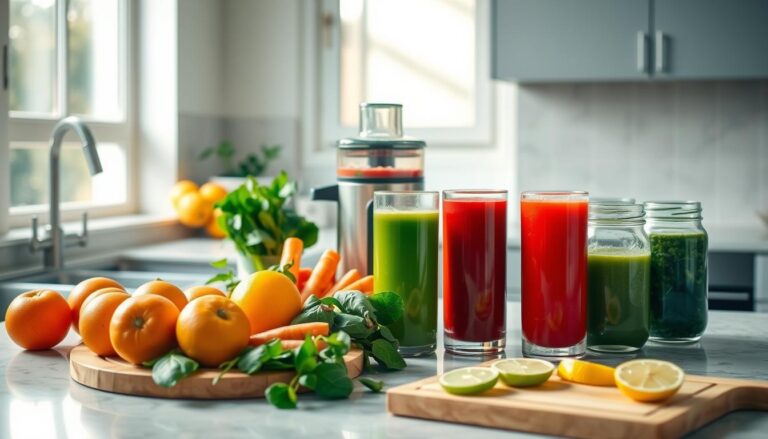Are you tired of hearing that vegans and vegetarians don’t get enough protein? Get ready to learn something new! We’re going to talk about the amazing benefits of plant based protein.
This guide will show you how it can change your health and fitness for the better.
We’ll cover the nutritional perks of eating vegan and vegetarian foods. We’ll also clear up some wrong ideas people have. Plus, we’ll give you easy tips to get enough protein from tasty plant-based foods.
Key Takeaways
- Plant based protein can provide all the essential amino acids your body needs
- Incorporating diverse plant-based protein sources ensures complete nutrition
- Dispelling the myth that plant-based diets lack protein
- Exploring the versatility and abundance of vegan and vegetarian protein options
- Practical tips to increase your plant-based protein intake
The Power of Plant Based Proteins
The plant kingdom is full of powerful proteins that can match animal based ones. Exploring plant-based proteins reveals many benefits that challenge old beliefs. It shows how a vegetarian or vegan diet can be great.
Exploring the Nutritional Benefits
Plant-based proteins are more than just a good source of protein. They also have essential amino acids, vitamins, minerals, and other good stuff. Lentils, beans, and peas are full of protein, fiber, and nutrients. Whole grains like quinoa, brown rice, and oats give you complex carbs and more nutrients. And soy products, such as tofu and tempeh have all the amino acids you need.
Debunking Myths About Vegetarian Diets
- Myth: Vegetarian diets lack sufficient protein.
- Fact: With the right plant-based foods, you can easily meet or even exceed your daily protein needs.
- Myth: Vegetarian diets are deficient in essential nutrients.
- Fact: A well-planned vegetarian diet can give you all the vitamins, minerals, and nutrients your body needs.
- Myth: Vegetarian diets are restrictive and boring.
- Fact: Plant-based cuisine is full of variety, delicious options, and is not boring at all.
By using the power of plant-based proteins and clearing up these myths, you open up a world of tasty and healthy food. You can feed your body with the nutrients it needs.

Eating a plant-based diet is not about sacrifice or deprivation it’s about embracing the abundance of flavors textures, and nutrients that the plant kingdom has to offer.
Get your protein from plant based food sources
You can easily get high-quality protein from many plant-based foods. Whether you’re a vegetarian vegan, or just adding more plants to your meals, there are lots of tasty options. Legumes nuts, and seeds are packed with protein and can help you get what you need.
Plant-based proteins are great because they also give you fiber vitamins, and minerals. They usually have less saturated fat and cholesterol than animal proteins. This makes them a better choice for your heart.
High Protein Vegetables Nature’s Hidden Gems
Many vegetables are not just good for you but also high in protein. Spinach, kale, and broccoli are great examples. They’re full of nutrients. Starchy veggies like lentils, beans, and peas are also great for protein and can be added to many dishes.
Protein Rich Grains and Seeds
Whole grains and seeds are full of protein too. Quinoa, amaranth, and bulgur are some high-protein grains. You can use them in salads, pilafs, or as a base for burgers or meatballs. Nuts and seeds like chia hemp, and pumpkin seeds are easy to add to snacks smoothies, or baked goods.
| Plant-Based Protein Source | Protein Content per 100g |
|---|---|
| Lentils | 25g |
| Tofu | 15g |
| Quinoa | 14g |
| Almonds | 21g |
| Spinach | 3g |
Adding a variety of plant-based proteins to your diet helps you meet your protein needs. It also brings many health benefits from eating more plants.
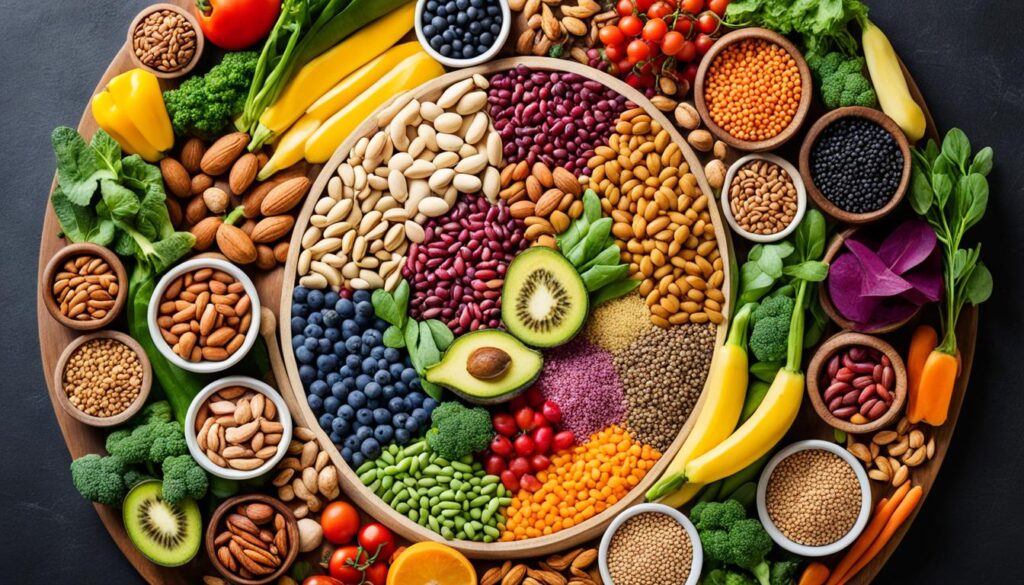
High Protein Legumes A Protein Powerhouse
Legumes include lentils, beans, and peas. They are nutritional superstars. These foods are full of protein, fiber, complex carbs, and important vitamins and minerals. Adding them to your diet can make your meals more protein-rich.
Lentils Beans and Peas Versatile and Nutritious
Lentils are great for vegetarians and vegans because they’re packed with protein. One cup of cooked lentils has 18 grams of protein, making them a good meat substitute. Beans like kidney beans and chickpeas, also have a lot of protein, offering 12 to 15 grams per cup. Peas, often forgotten, have 8 grams of protein per cup.
Legumes boost your protein intake and are full of other nutrients. They’re high in fiber, which is good for your gut, and complex carbs for energy. They also have important minerals like iron, folate, and zinc. This makes them a great addition to any plant-based meal.
| Legume | Protein per cooked cup | Fiber per cooked cup |
|---|---|---|
| Lentils | 18g | 15g |
| Kidney Beans | 15g | 13g |
| Chickpeas | 12g | 12g |
| Green Peas | 8g | 7g |
Legumes are easy to add to many dishes, from soups and stews to burgers and tacos. Try different types, cooking ways, and flavors to keep your meals exciting and full of protein.

Legumes are a true powerhouse of plant-based nutrition, offering a unique blend of protein, fiber, and essential nutrients that can elevate any plant-based diet.
Nuts and Seeds Compact Sources of Plant Protein
Want to increase your plant-based protein? Check out nuts and seeds. They are small, easy to carry, and full of protein and other important nutrients. These foods can greatly improve your health and wellness.
Almonds and walnuts are crunchy and tasty. Pumpkin seeds and chia seeds are smooth and nutty. There are many options in the world of nuts and seeds. They can make your meals more exciting and keep you healthy.
Nuts: Protein Packed Perfection
Nuts are amazing for their high protein content. Almonds have 6 grams of protein per serving. Walnuts give you 4 grams. And peanuts which are actually legumes have 7 grams of protein per serving. They are great for snacking and cooking.
- Almonds: 6g protein per serving
- Walnuts: 4g protein per serving
- Peanuts: 7g protein per serving
Seeds Small but Mighty
Seeds may be small but they are full of protein. Chia seeds and hemp seeds have 4 and 5 grams of protein per serving. Pumpkin seeds also have 5 grams of protein and are crunchy.
- Chia seeds: 4g protein per serving
- Hemp seeds: 5g protein per serving
- Pumpkin seeds: 5g protein per serving
Adding nuts and seeds to your diet is easy. You can sprinkle them on salads, blend them into smoothies, or just eat them as a snack. There are many ways to use these foods to get more plant-based protein.
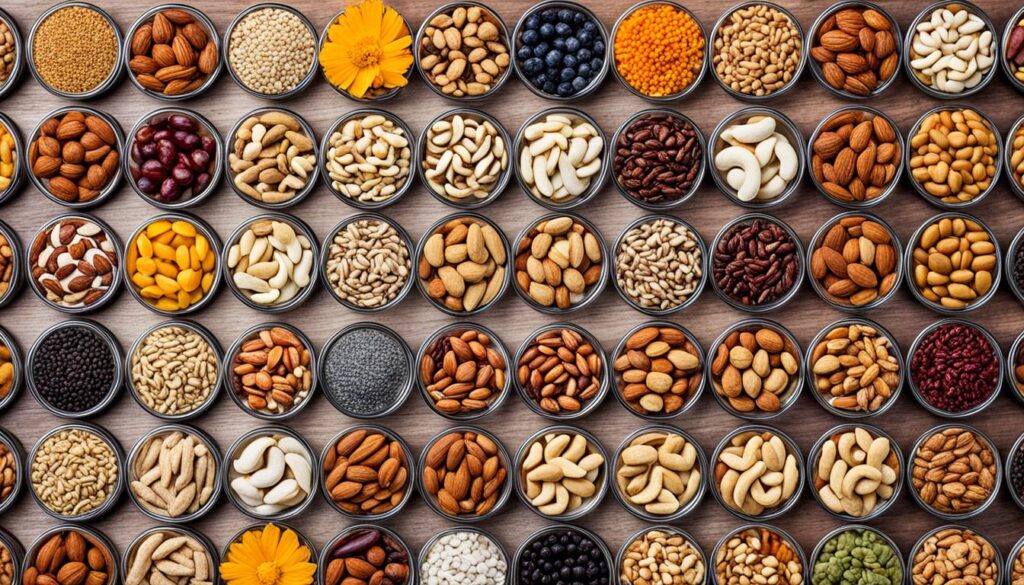
Nuts and seeds are the ultimate plant-based protein powerhouses, offering a convenient and delicious way to fuel your body.
Soy Products A Meat Alternative Marvel
Soy products are a big deal in the plant based protein world. They offer a meat like texture and are packed with nutrients. Tofu and tempeh are key players in vegetarian and vegan diets. They provide a tasty and protein rich choice instead of animal-based proteins.
Tofu The Culinary Chameleon
Tofu comes from soy milk that’s been pressed and coagulated. It’s super versatile and can change to fit many dishes. Its mild taste and soft texture make it great for soaking up flavors. You can find it in everything from crispy stir-fries to smooth puddings.
Tempeh The Fermented Powerhouse
Tempeh is a fermented soybean food from Indonesia. It has a unique taste and a firmer texture than tofu. The fermentation boosts its nutrition and gives it a nutty flavor. You can use it in many dishes, like burgers, stir-fries, or even as a meat substitute for breakfast.
There are more soy-based foods out there, like soy meat crumbles and cheese alternatives. These options make it easy to add soy to a plant-based diet. They’re tasty and packed with protein.
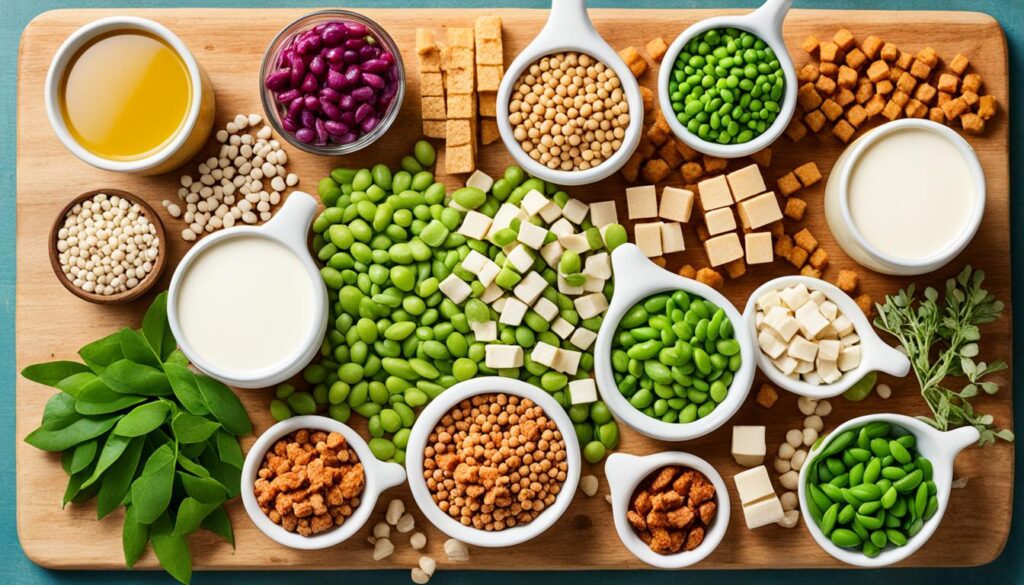
Soy products are a game-changer for those seeking to increase their plant based protein intake. They offer a delicious and versatile solution that can be easily incorporated into a wide range of dishes.
Whole Grains Unsung Heroes of Plant Based Protein
Whole grains are often overlooked when talking about plant-based protein. But they are true nutritional powerhouses. Quinoa, brown rice, oats, and barley are just a few examples of whole grains that are packed with plant-based protein. These grains can help you meet your daily protein needs.
Quinoa is known as a superfood because it’s a complete protein. This means it has all the essential amino acids your body needs. Eating one cup of cooked quinoa gives you 8 grams of plant protein. Brown rice is also a great choice offering 5 grams of plant protein per cup.
Oats are a breakfast favorite and a great source of whole grains and plant protein. A single serving of oatmeal has about 5 grams of protein. This helps you stay full and satisfied all day.
Adding whole grains to your plant-based meals is simple. Try using brown rice instead of white rice, or add quinoa to salads and baked goods. Oats can be made into overnight oats or hearty oatmeal.
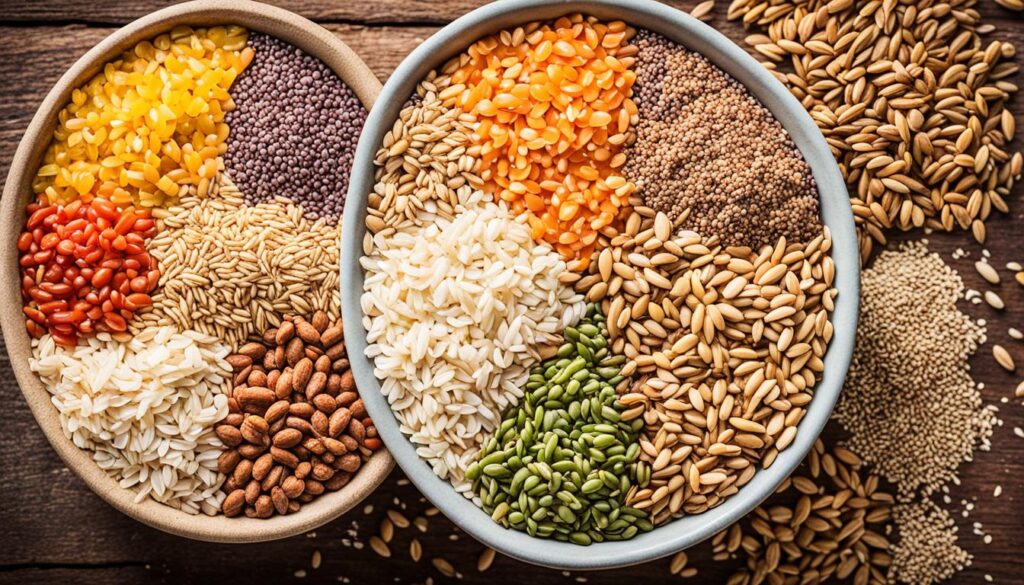
It’s important to focus on whole grains over refined or processed ones. Whole grains keep their fiber, vitamins, and minerals. By choosing whole grains, you’ll increase your plant protein intake and enjoy many health benefits.
| Whole Grain | Protein Content per cup cooked |
|---|---|
| Quinoa | 8 grams |
| Brown Rice | 5 grams |
| Oats | 5 grams |
| Barley | 4 grams |
| Bulgur | 4 grams |
Whole grains are the unsung heroes of plant-based protein. They offer a wealth of nutrients and can help you reach your daily protein goals with ease.
Don’t forget to include whole grains in your plant based meals. They may seem simple but they are key to a balanced, protein rich diet.
High Protein Vegetables Nature’s Hidden Gems
Vegetables are often overlooked when it comes to plant-based protein. But, they are packed with high-quality protein. Leafy greens and other vegetables are full of nutrients and protein. There’s a lot to discover in the world of protein-rich veggies.
Leafy Greens and Beyond
Leafy greens like spinach, kale, and collard greens are super protein-rich. One cup of cooked spinach has 5 grams of protein. But, there’s more to protein rich veggies than just salads.
Broccoli Brussels sprouts, and asparagus also have a lot of protein, with 3-4 grams per cup. Artichokes and peas are great for a protein boost, with 4 and 8 grams per cup, respectively. Even carrots and zucchini have a good amount of protein.
| Vegetable | Protein per 1 cup cooked |
|---|---|
| Spinach | 5 grams |
| Broccoli | 3 grams |
| Brussels Sprouts | 4 grams |
| Asparagus | 3 grams |
| Peas | 8 grams |
Don’t just stick to the usual veggies. Explore the many high-protein vegetables nature offers. With a bit of creativity, you can easily add these nutrient-rich options to your meals for a protein boost.
Vegetables are a critical component of a healthy, balanced diet – and they can pack a serious protein punch, too. Giving these leafy greens and other hidden gems a starring role in your meals is a simple way to boost your plant-based protein intake.
Plant Based Protein Combinations for Complete Nutrition
Getting enough protein from plants can be tough, but don’t worry! Mixing different plant-based proteins helps you get all the amino acids your body needs. Let’s dive into the world of plant protein combinations to boost your plant-based meals.
Legumes like lentils, beans, and peas are top choices for plant-based protein. But don’t just stop there. Add whole grains such as quinoa or brown rice to them for a complete amino acid mix. Nuts and seeds, especially almonds and chia, are great too. They add crunch and flavor to your meals.
Soy products including tofu and tempeh, are also great for protein. Pair them with leafy greens and colorful veggies for a meal full of nutrients. The secret is to try different plant-based protein mixes. Be creative, experiment, and enjoy the tasty benefits of a plant-based diet.
FAQ
What are the benefits of getting protein from plant based sources?
Plant-based proteins are full of fiber vitamins, and minerals. They help keep you healthy. They’re also better for the planet and animals than animal-based proteins. Eating more plant-based proteins is good for everyone.
Aren’t vegetarian and vegan diets lacking in protein?
No way! It’s easy to get enough protein on a plant-based diet. Foods like legumes nuts, seeds, whole grains, and soy are great for protein. Just get creative in the kitchen.
What are some high protein plant-based foods I should try?
Legumes like lentils, beans, and peas are full of protein. Nuts and seeds, such as almonds and chia, are also good. Soy products like tofu and tempeh are packed with protein. And don’t forget about quinoa, a whole grain that’s high in protein.
How can I make sure I’m getting complete proteins on a plant based diet?
Combining different plant-based foods gives you all the amino acids you need. Try mixing grains with legumes or adding nuts and seeds to salads. Eating a variety of plant-based proteins every day is key.
Are there any high protein vegetables I should be eating?
Yes! Leafy greens like spinach and kale are surprisingly high in protein. Broccoli, Brussels sprouts, and sweet potatoes are also good sources. Adding these veggies to your meals is an easy way to increase your plant-based protein.
